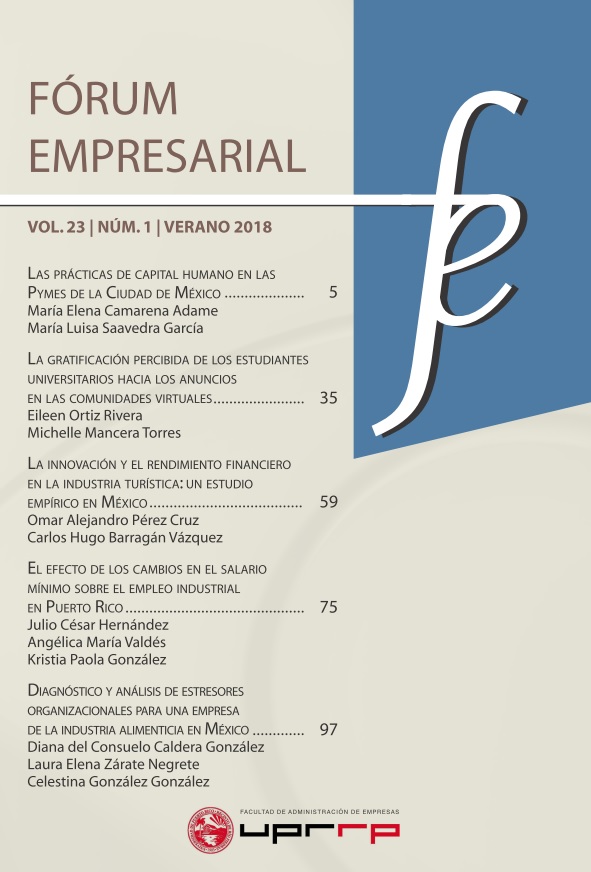Abstract
The objective of this paper is to identify the main stressors that influence the performance of a company in the food industry and its causes, which will allow for the provision of recommendations to reduce the negative impact of the identified factors. The organization was selected incidentally. Two Likert-scale surveys were applied to a sample of 300 employees. The main stressors identified in the different areas of the organization among trusted staff personnel were: work overload, poor communication, limited opportunities for promotion, insufficient support (regarding training), and lack of knowledge of job-related duties. Among the operational staff, the main stressors identified were: work overload, family problems, health and nutrition, limited opportunities for promotion, and insufficient support.
References
Azcona, J. R., Pastrana, J. I., Subirán, C., & Meléndez, A. (2016). Guía sobre el manejo del estrés desde medicina del trabajo. En A. Iniesta (Coord.), Asociación Española de Especialistas en Medicina del Trabajo. Barcelona, España: Edición Sans Growing Brands.
Gilbert, S., & Kelloway, K. (2014). Using single items to measure job stressors. International Journal of Workplace Health Management, 7(3), 86–199.
Instituto Nacional de Estadística y Geografía. (2017). Banco de Información Económica. Recuperado de http://www.inegi.org.mx/sistemas/bie/
Ivancevich, J. M., & Mattenson, M. (1985). Estrés y trabajo. México, D. F., México: Editorial Trillas.
Mansilla, F., & Favieres, A. (2011). Factores de riesgo psicosociales en el trabajo. Madrid, España: Ayuntamiento de Madrid.
Omar, A. (2006). Justicia organizacional, individualismo-colectivismo y estrés laboral. Psicología y Salud, 16(2), 207–217.
Organización para la Cooperación y el Desarrollo Económico (2015). Mexico. OECD Better Life Index. Recuperado de http://www.oecdbetterlifeindex.org/countries/mexico/
Organización Internacional del Trabajo. (2013). La organización del trabajo y los riesgos psicosociales: Una mirada al género. Recuperado de http://www.ilo.org/wcmsp5/groups/public/---americas/---ro-lima/---sro-san_jose/documents/publication/wcms_227402.pdf
Organización Mundial de la Salud. (2004). La organización del trabajo y el estrés: Estrategias sistemáticas de solución de problemas para empleadores, personal directivo y representantes sindicales. Recuperado de http://www.who.int/occupational_health/publications/pwh3sp.pdf?ua=1
Poy, L. (7 de octubre de 2017). Padecen estrés laboral, 40 por ciento de trabajadores en México. Periódico La Jornada. Recuperado de http://www.jornada.unam.mx/2017/10/07/sociedad/034n1soc
Proméxico. (2016). Sector de alimentos procesados en México. Recuperado de https://www.gob.mx/promexico/acciones-y-programas/alimentos-procesados?idiom=es
Ren, F., & Zhang, J. (2015). Job stressors, organizational innovation climate, and employees‘ innovative behavior. Creativity Research Journal, 27(1), 16–23.
Rodríguez, I., & Peiro, J. M. (2008). Estrés laboral, liderazgo y salud organizacional. Papeles del Psicólogo, 29(1), 68–82.
Román, C. A., & Hernández, Y. (2011). El estrés académico: Una revisión crítica del concepto desde las ciencias de la educación. Revista Electrónica de Psicología Iztacala, 14(2), 2–14.
Selye, H. (1976). The stress of my life. New York, NY: McGraw Hill.
Sonnentag, S., & Fritz, C. (2015). Recovery from job stress: The stressor-detachment model as an integrative framework. Journal of Organizational Behavior, 36(1), S72–S103.
Villacís, D. (2015). La autonomía temporal y decisional y su incidencia en la producción de daños psicosomáticos cognitivos, fisiológicos y motores en los trabajadores de la constructora Albra Constructores en la zona urbana de la ciudad de Quito durante el primer semestre del año 2013 (Tesis de maestría). Universidad Central del Ecuador, Ecuador. Recuperado de http://www.dspace.uce.edu.ec/bitstream/25000/7627/1/T-UCE-0007-44pg.pdf
By submitting a contribution to consideration of the Editorial Board of Fórum Empresarial, the authors attest that it is an original, unpublished work, which has not been nor will be simultaneously submitted to another journal for consideration and publication; that they are responsible for the work carried out and the content of the article; and they have the corresponding copyrights.
The authors grant the right of first publication of their work to Fórum Empresarial, in any medium and physical and electronic format, including internet. Publication shall be subject to the Creative Commons Attribution-NonCommercial 4.0 International License, which allows third parties to share the work, provided that the author and Fórum Empresarial (as a first publication) are cited.
The journal allows authors to retain publishing rights without restrictions. Authors are able to enter into separate, additional arrangements for the non-exclusive distribution of the journal's published version of the work (e.g., post it to an institutional repository or publish it in a book), with an acknowledgment of its initial publication in Fórum Empresarial.

